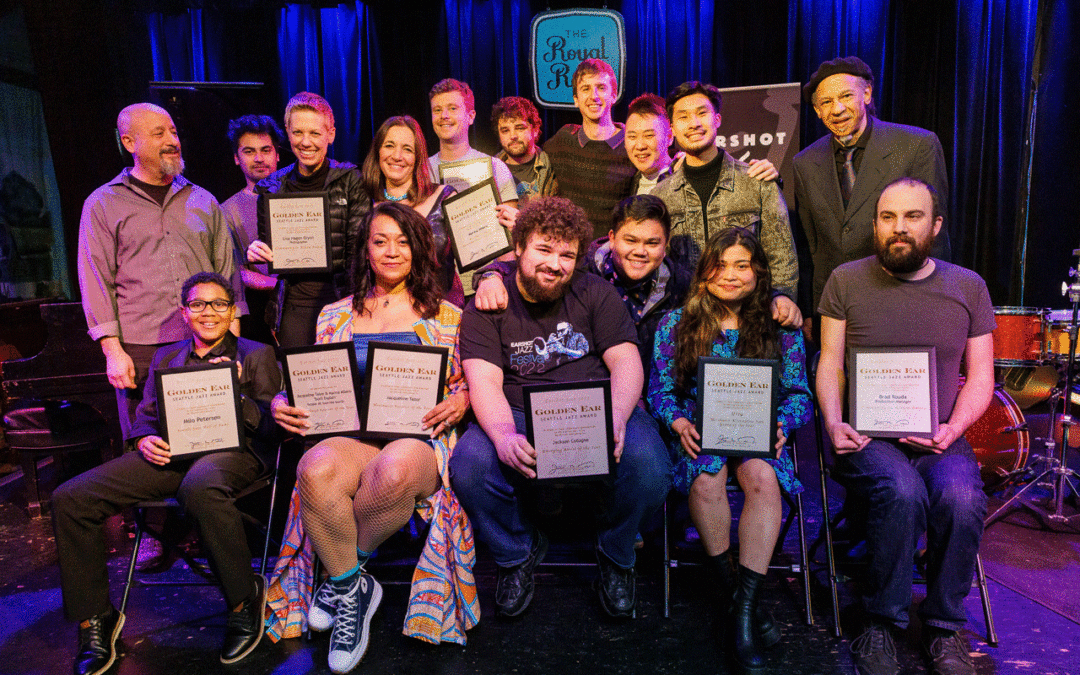2022 Golden Ear Awards , awardees, photo by Jim Levitt
Back Row: Bill Anschell, Xavier Lecouturier, Lisa Hagen Glynn, Marina Albero, Martin
Budde, Julio Estrada, Scott Elder, Billy Wu, Jason Chan, Nathan Breedlove
Front Row: Donovon Kranzler-Lewis (posing with Milo Petersen’s award), Jacqueline Tabor,
Jackson Cotugno, Andrew Sumabat, Katyrose Jordan, Brad Rouda
BY M.V. SMITH
The Oscars have the Dolby Theatre.
The Tonys have Radio City.
The Golden Ears have The Royal Room.
And where better to commemorate a town of working musicians than in their natural surroundings?
Albero exemplifies that hard-working ethos, driving ninety miles one way to her teaching job at Western Washington University. Drummer Xavier Lecouturier does too, so fresh from the last date of his tour with The Tiptons that he couldn’t even stop at home before his Golden Ear gig.
A few tunes into the jam session that followed the awards, Thomas Marriott asks, “Is there a bassist in the house?” Bruce Phares answers the call. Taking his place on stage behind pianist Ann Reynolds, saxophonist Darian Asplund, and guitarist Ian Hughes, he launches into a playful rendition of Herbie Hancock’s “Cantaloupe Island.”
Scene veterans aren’t an unusual sight at a jam session, but the drummer backing them is. Ten-year-old Donovan Kranzler-Lewis is a fifth-generation Seattle musician, following in his father D’Vonne Lewis’ footsteps behind the kit. Beaming as he keeps the beat, he exits the stage to some of the loudest applause of the night.
While hard work is essential, community is paramount. On March 13, Seattle’s jazz scene gathered at The Royal Room to acknowledge and celebrate the following for their achievements and impressive musicianship from 2022.
NORTHWEST RECORDING OF THE YEAR: EARTHSHINE, MERIDIAN ODYSSEY
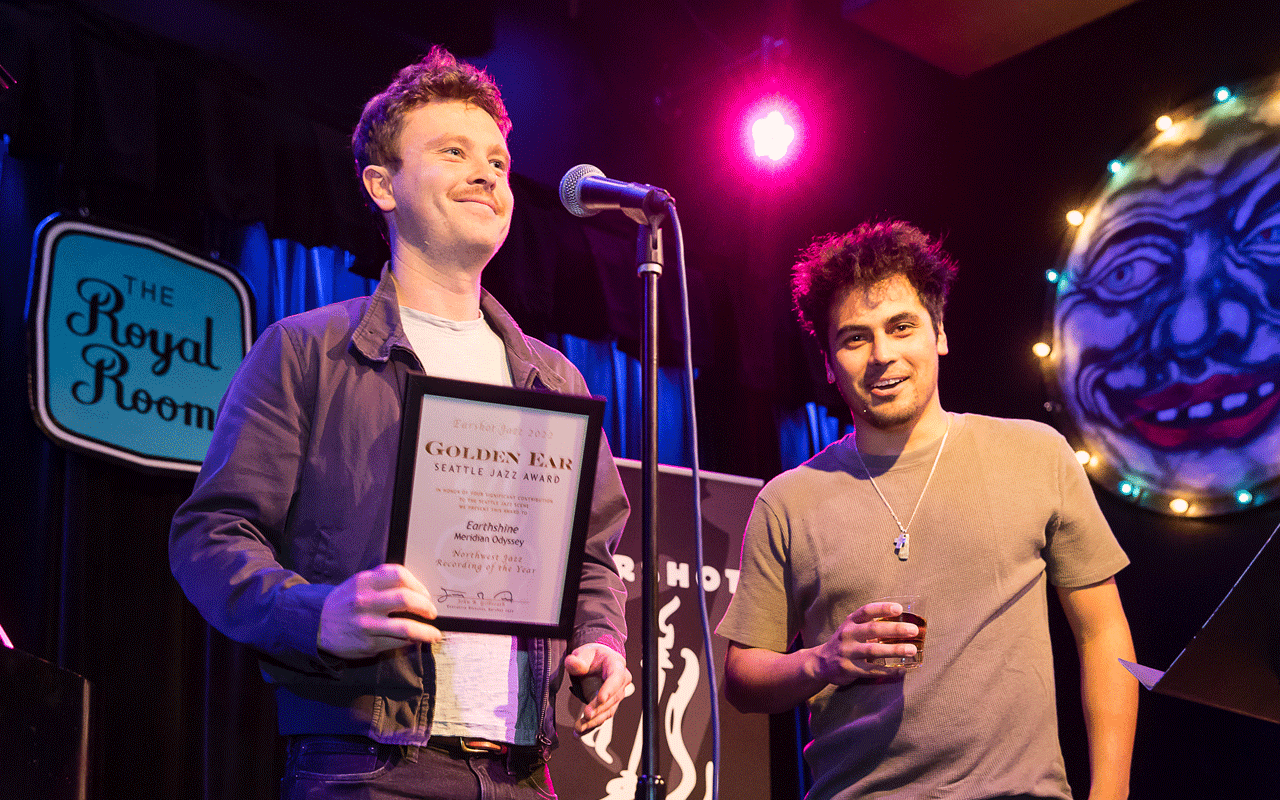
“The whole thing is pretty DIY,” says Meridian Odyssey guitarist Martin Budde of the band’s operations. In addition to booking their own tours, Meridian Odyssey (Budde, drummer Xavier Lecouturier, pianist Dylan Hayes, saxophonist Santosh Sharma, trumpeter Noah Halpern, and bassist Ben Feldman) recorded both Earthshine and their debut album Second Wave by themselves at a makeshift studio they built inside an old airplane hangar in Budde’s hometown of Big Lake, Alaska. Xavier Lecouturier, who engineered Earthshine, recalls that his initial apprehension about the music gradually gave way to pride. “I remember the first day we rehearsed, it was like…oh my God, it was rough. But as the week went on, it was like ‘Oh, wow, this is actually pretty cool!’” Lecouturier believes the extracurricular aspects of the Earthshine sessions indelibly influenced the finished product. “We were up in Alaska for a week, all hanging together, eating together, going out for hikes together,” experiences that helped the bandmates form deeper friendships. “I think you can kind of hear that in the music,” he says.
Both Budde and Lecouturier praise new member Halpern (a bandmate of Sharma’s going back to middle school) for the creative jolt his presence gave Earthshine. Budde points out Halpern and Sharma’s “unspoken chemistry,” a connection that spread to the other musicians; in their excitement, “everybody wrote trumpet solos in their charts,” he laughs. According to Budde, Halpern provided a new “sonic texture” that “allowed for another voice.” In contrast to Second Wave, Earthshine’s harmonies “are a little more arranged, there’s more parts going on,” he explains.
As for their Golden Ear win, Lecouturier feels honored to be singled out among Meridian Odyssey’s peers on the scene. Because Seattle’s jazz scene is “such a small community,” Lecouturier counts many local musicians among his friends. “I think it means even more, in that sense,” he says.
NORTHWEST ACOUSTIC JAZZ ENSEMBLE OF THE YEAR: BILL ANSCHELL TRIO
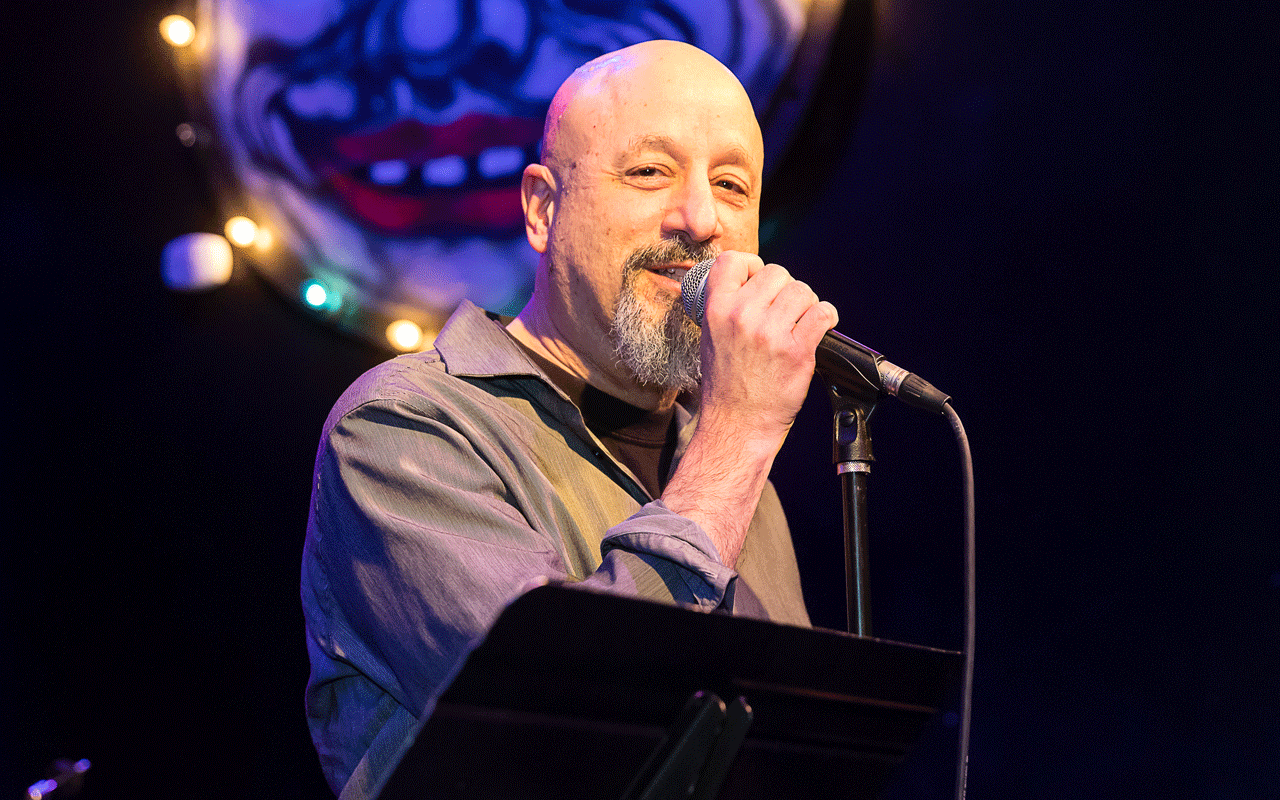
“As for stage presence, I’m the straight man,” says pianist Bill Anschell, a frequent Golden Ear awardee and a 2016 inductee into the Seattle Jazz Hall of Fame. Anschell’s reserved nature is reflected in his style as a bandleader. “I aim to be as unleaderlike as I can. I try to involve other band members in decisions, give them all the information I have about specific gigs as soon as I get it, and pick tunes we all like to play.”
Bassist Jeff Johnson and drummer D’Vonne Lewis, bandmates in the Bill Anschell Trio are more extroverted performers. “Both of those guys just light up when they hear something they like or when the music is grooving hard” but Anschell finds that playing the piano allows him to assert himself musically. He cherishes the interplay the band has honed over the years; in his opinion “we probably can now make sharper turns spontaneously than in the past, just from knowing one another’s playing better.”
Anschell strives to achieve a similar interplay with the Trio’s audiences. “When the stars are aligned and we’re each trying new things, while at the same time, we’re interacting with real spontaneity, people can tell something’s happening.”
NORTHWEST ALTERNATIVE JAZZ GROUP OF THE YEAR: I///U
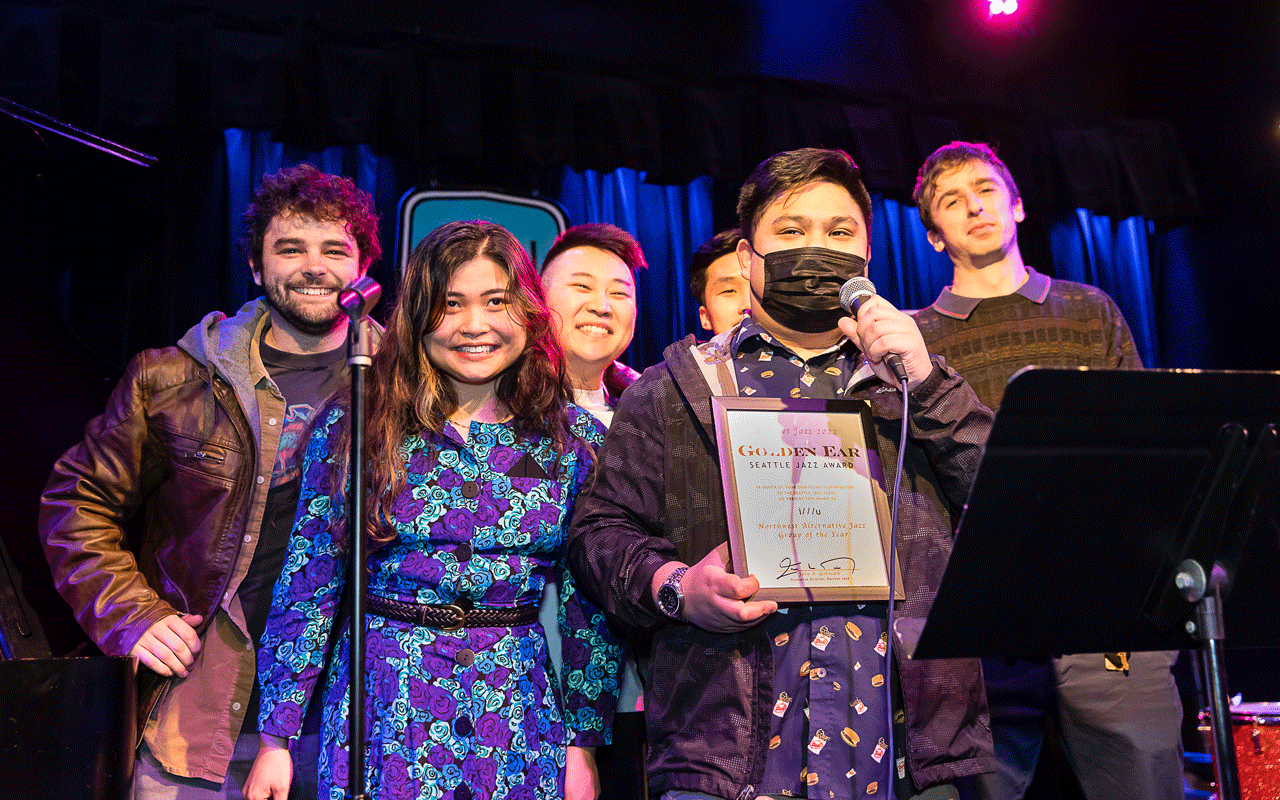
When he came to the University of Washington (UW) from Baton Rouge, i///u bassist Scott Elder had sworn off bandleading. “I had a high school band in Louisiana, and it was a ton of work. When I got to Seattle, I was like ‘I’m not gonna start a band, I’m just gonna be in somebody else’s band,’” but once he got to campus, the offers just weren’t coming. “So, I enlisted folks in all the strangest places,” from practice rooms to the University Book Store. i///u’s current lineup features founding members Elder, vocalist Katyrose Jordan, drummer Billy Wu, and keyboardist Jason Chan, joined by guitarist Julio Estrada and Andrew Sumabat on saxophone, brass, and EWI.
Starting from a foundation of Soulquarians-style neo-soul, new influences gradually entered the mix—Elder cites Butcher Brown, Hiatus Kaiyote, and Moonchild, among others—colored by sophisticated harmonies. “All of our members studied jazz so we tend to integrate that knowledge and feeling into whatever we’re doing,” says Elder.
In the wake of their 2018 formation, i///u found quick success, graduating from the UW house party circuit to a 2019 victory at MoPOP’s Sound Off! battle of the bands and a set at that year’s Bumbershoot festival. Forced by the pandemic to cancel an EP release and a national tour, i///u improvised a series of social media “instajams” to maintain their musical connection. As Elder remembers, “Looking back, it’s incredible to think that we recorded those instajams without ever seeing each other in person! It was definitely an experience that brought us closer together, and provided a fun and creative outlet during such a difficult time.” As the pandemic has eased, they’ve gradually rebuilt their momentum, with last month’s headliner gig at Neumos under their belt and a performance at this summer’s Capitol Hill Block Party on the horizon, i///u is on the move.
Jordan is grateful that i///u’s Golden Ear win has cemented their place in Seattle’s jazz community. “We are students of this music and this craft,” she says. “We feel honored to even play it and to represent it.… To create our own ideas from that background is a privilege.”
NORTHWEST EMERGING ARTIST OF THE YEAR: JACKSON COTUGNO
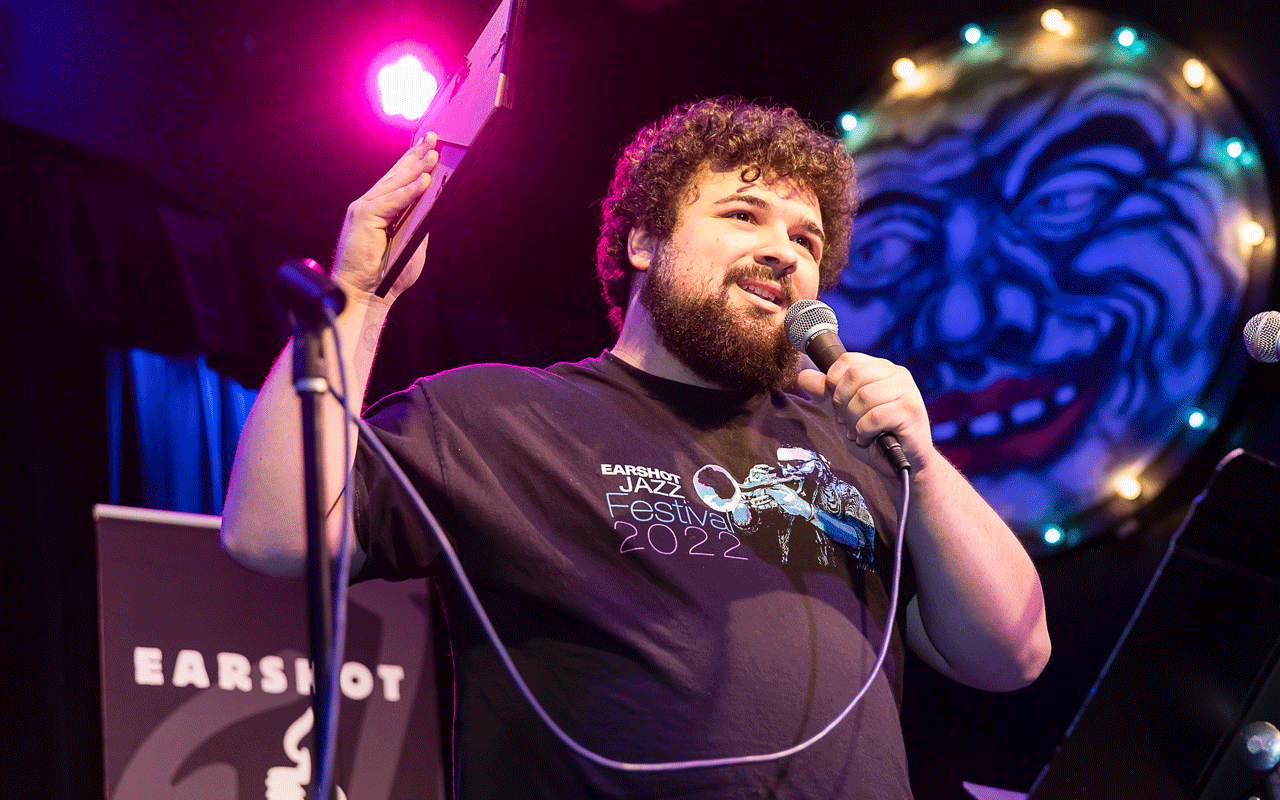
Still in his early twenties, saxophonist Jackson Cotugno had barely begun his professional career when the pandemic hit. He had recently dropped out of music school so he welcomed the opportunity to play livestream shows, but the strangeness of performing for a webcam eventually unsettled him. Since clubs have reopened, he’s made up for lost time, honing his irrepressible stage presence as a member of Forager and Manzama Sheen, and making his mark as an in-demand sideman—most memorably as part of Alex Dugdale’s Big Band at last year’s Earshot Festival.
Cotugno has quickly built a formidable reputation; he performs with many of Seattle’s finest jazz musicians as part of the Fellowship ‘Ceptet’s rotating lineup, and just last month made his Seattle debut as a bandleader at Vermillion. His Golden Ear win affords him the unexpected opportunity to take stock of his career just a few years after it began. And at a time when many young artists like Cotugno are “just doing what we can to survive,” the honor “makes me reflect on how lucky I’ve been.”
NORTHWEST JAZZ INSTRUMENTALIST OF THE YEAR: MARINA ALBERO
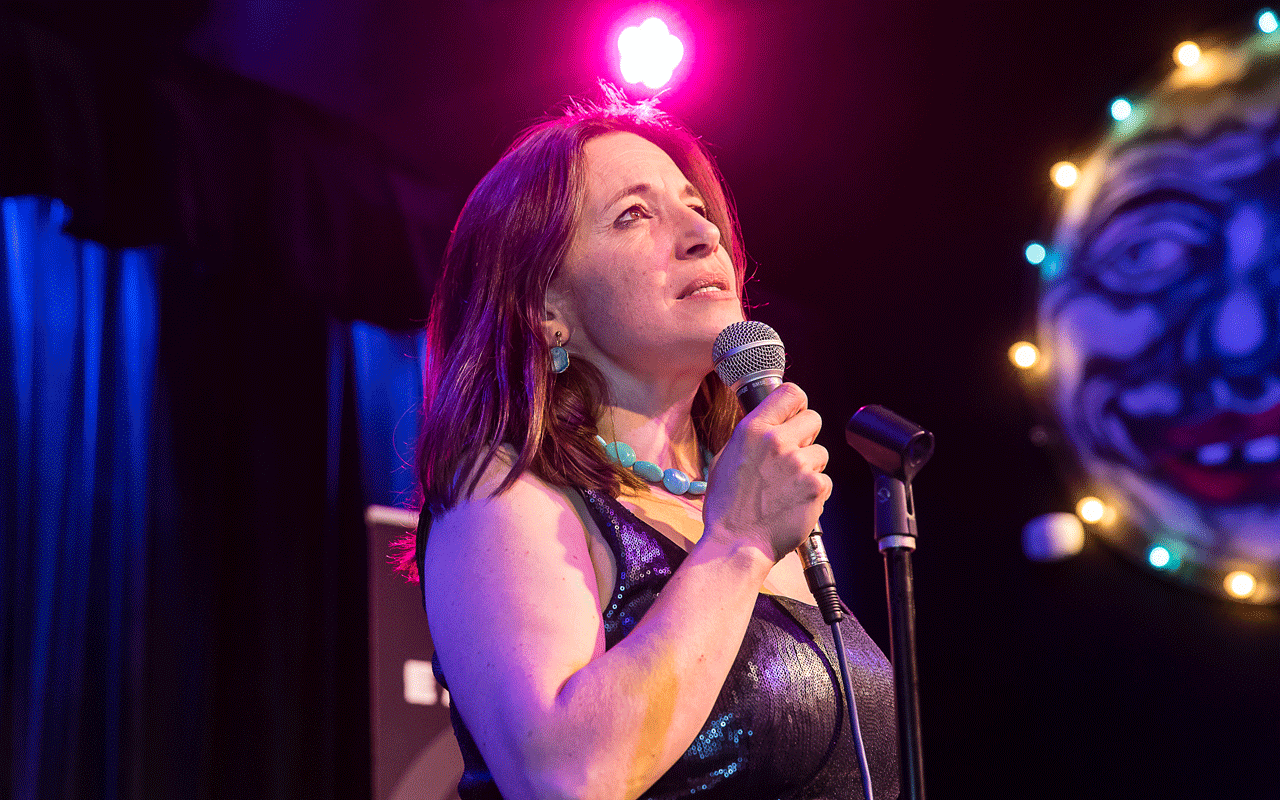
Onstage, pianist Marina Albero is a whirlwind of energy—dancing in her seat, stomping her ruby-red high heels to keep time, whooping with delight at the music. “Jazz can seem a little unattainable to the general public. It’s a music that can seem like you have to know a lot. That people can enjoy my physical way of playing the piano is to me a great compliment.”
For Albero, moving to Seattle “gave me the freedom to believe in myself again.” The daughter of a prominent Catalan musical family, in Spain, Albero felt stifled by the expectations those associations placed on her. “I was in kind of a dark spot, I guess,” she explains. To her Spanish audience, she was “always somebody’s daughter, always somebody’s wife, always somebody’s sister. Here in Seattle I didn’t have that.”
Reflecting on her Golden Ear win, Albero celebrates the talent of her peers on the scene, “It’s overwhelming, because you never expect such an honor—especially in a city full of great musicians.”
NORTHWEST JAZZ VOCALIST OF THE YEAR: JACQUELINE TABOR
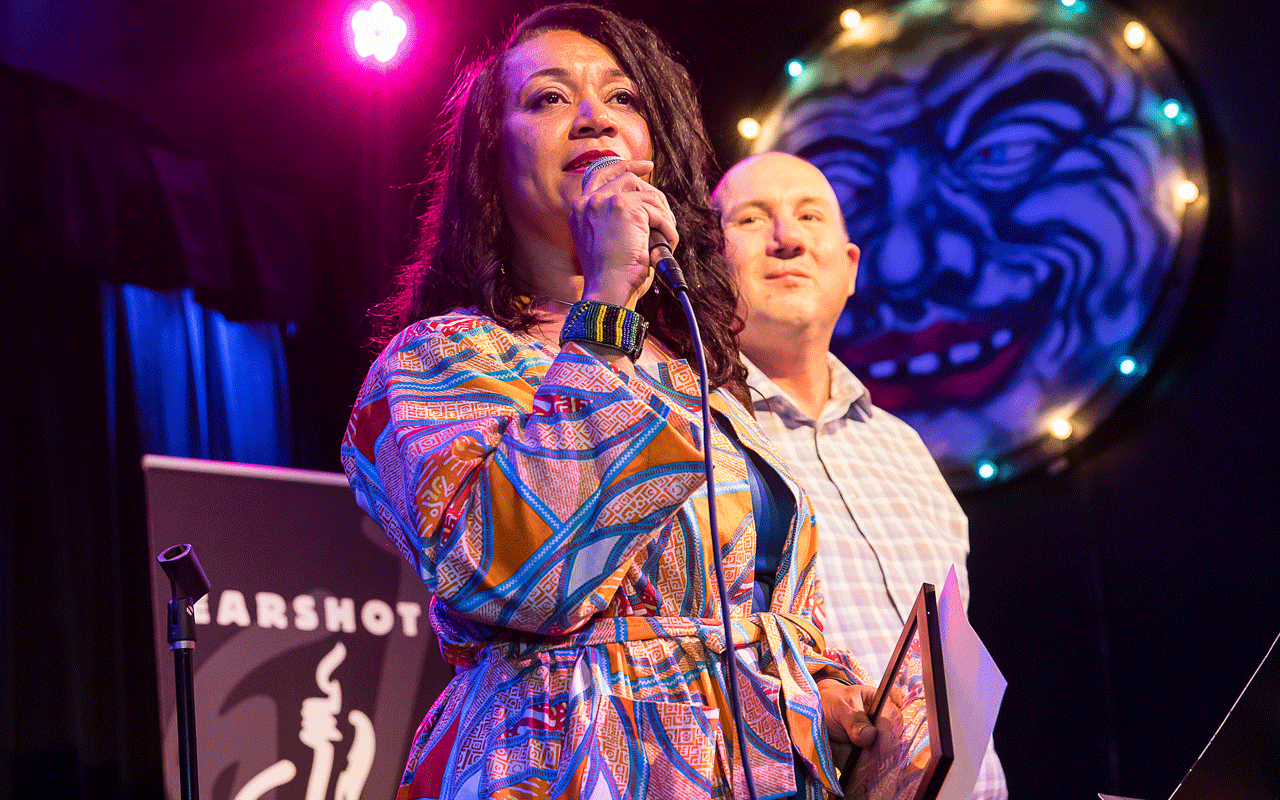
Four-time Vocalist of the Year, Jacqueline Tabor has been a vital presence in Seattle jazz for nearly twenty years. Tabor has released three albums, fronted the Seattle Repertory Jazz Orchestra in tributes to the music of the Harlem Renaissance and Billie Holiday, and was artist-in-residence for Café Nordo’s 2022 Summer Jazz Series. This March, she celebrated the debut of her new band Big Mama’s Blues Brigade at Vermillion.
Tabor studied music but didn’t pursue singing seriously until she was in her thirties. Tabor has cited the influence of Sarah Vaughan and Koko Taylor, among others, but she is adamant about her unclassifiability. “My musical personality is who I am everyday—just me. I try not to restrict myself with a label, I have plenty of those already,” she says.
While Tabor is grateful to be honored, she guards her artistic independence. “I cannot rely on others’ approval, especially when it comes to being a creative,” she says. “Relying on the institution to validate you, especially in the arts, can cause you to not be your authentic self; rather, a prototype of someone else’s vision.”
NORTHWEST CONCERT OF THE YEAR: JACQUELINE TABOR & MARINA ALBERO, ”DON’T EXPLAIN,” 10/20, TOWN HALL SEATTLE
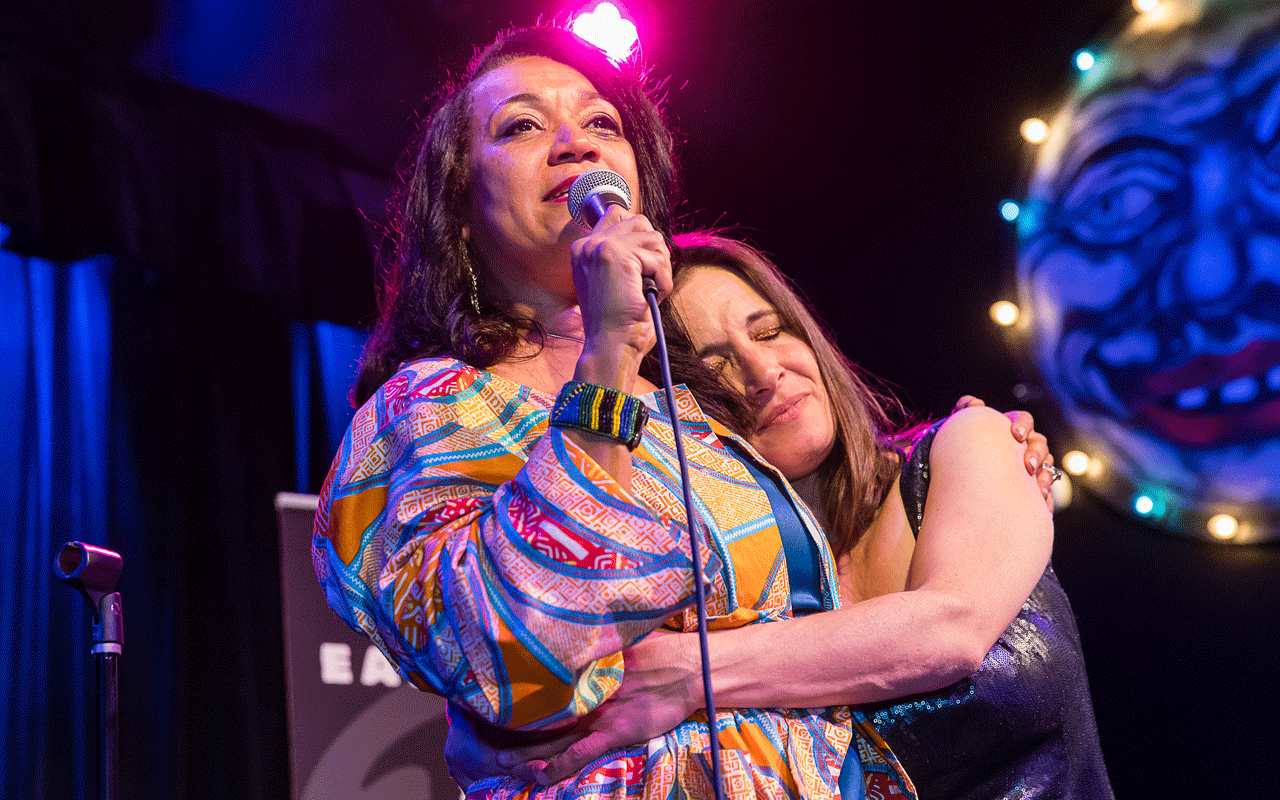
Building on her tribute to Billie Holiday with the Seattle Repertory Jazz Orchestra, over the course of the pandemic Jacqueline Tabor and her north Seattle neighbor Marina Albero developed “Don’t Explain,” named for Holiday’s longtime set-closing showstopper. Through heartfelt conversations about their shared family histories of activism and 2020’s George Floyd protests, Tabor and Albero conceived a performance using the lives of Holiday and Nina Simone as a vehicle to grapple with America’s legacy of racism.
Reflecting on their talks, Albero appreciates the lessons she learned about her adopted home. “To me, learning about the Black experience in America—especially a Black woman with kids—was a beautiful way of learning about this country and this culture,” she says. Albero believes the experience was therapeutic for her friend. “I think for Jacqueline, from what she tells me, it was very refreshing that she could talk to me, knowing that I don’t share that background, so she felt very free to express herself.”
In addition to performing selections from the Holiday and Simone songbooks, Albero and Tabor engaged in dialogue in character as Eleanora and Eunice—Holiday and Simone’s given names. While she felt uncertain about how concertgoers would respond to “Don’t Explain’s” conceptual complexity, Tabor forged ahead. “Absolutely, I worried, and we proceeded. The beautiful thing about a performance is you can like it or not—it’s up the audience to choose.”
Tabor’s second Golden Ear victory of the night proves she was right to trust her gut. Albero remembers how powerful the performance felt in the moment: “The range of emotions and their intensity—how distinguished they were and how full they were—that’s amazing.” For her part, Tabor is grateful for the new confidence she feels in “Don’t Explain’s” wake. “I learned how to lean into my feminine strength and empower my voice through song and story,” she says. She also values the support her friend has shown her. “I now approach things with a wider lens of endless possibilities because of working with Marina. I have learned how to ask for what I need and to no longer suffer in silence.”
SEATTLE JAZZ HALL OF FAME: NATHAN BREEDLOVE & MILO PETERSEN
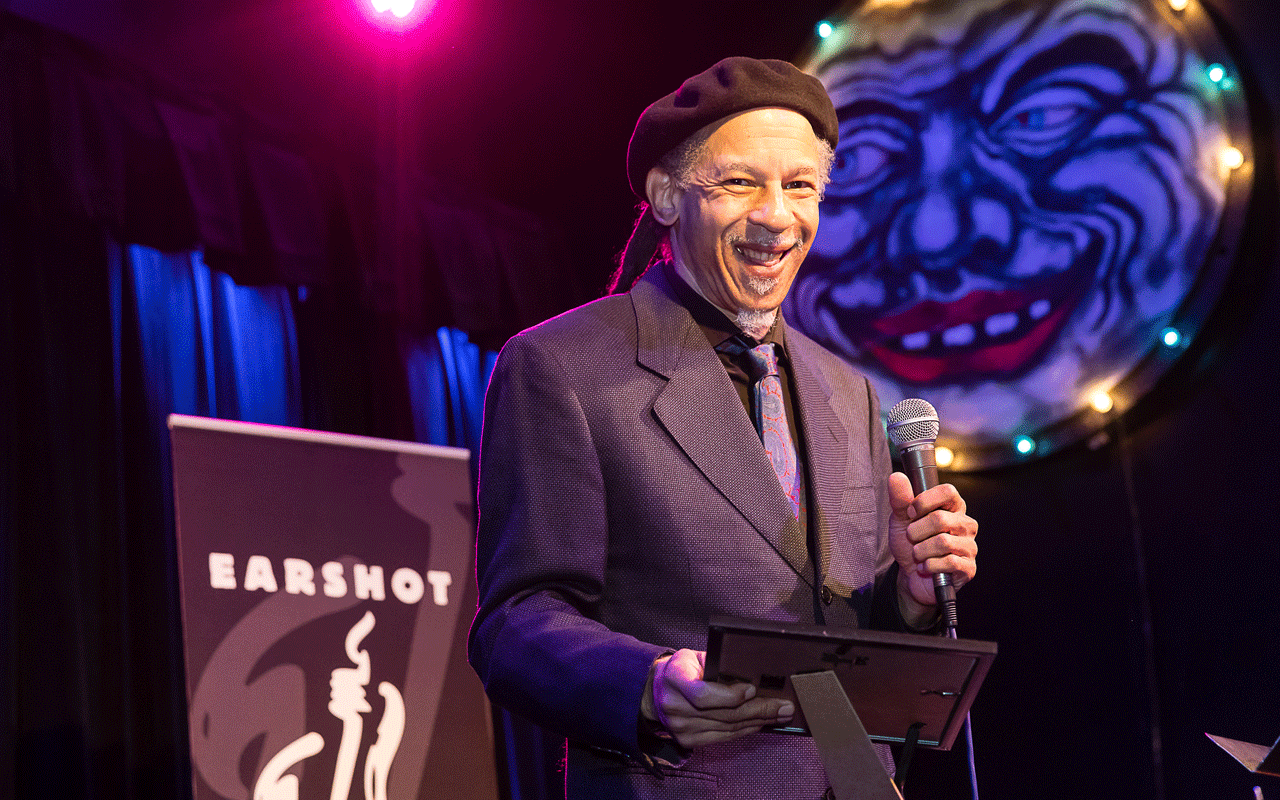
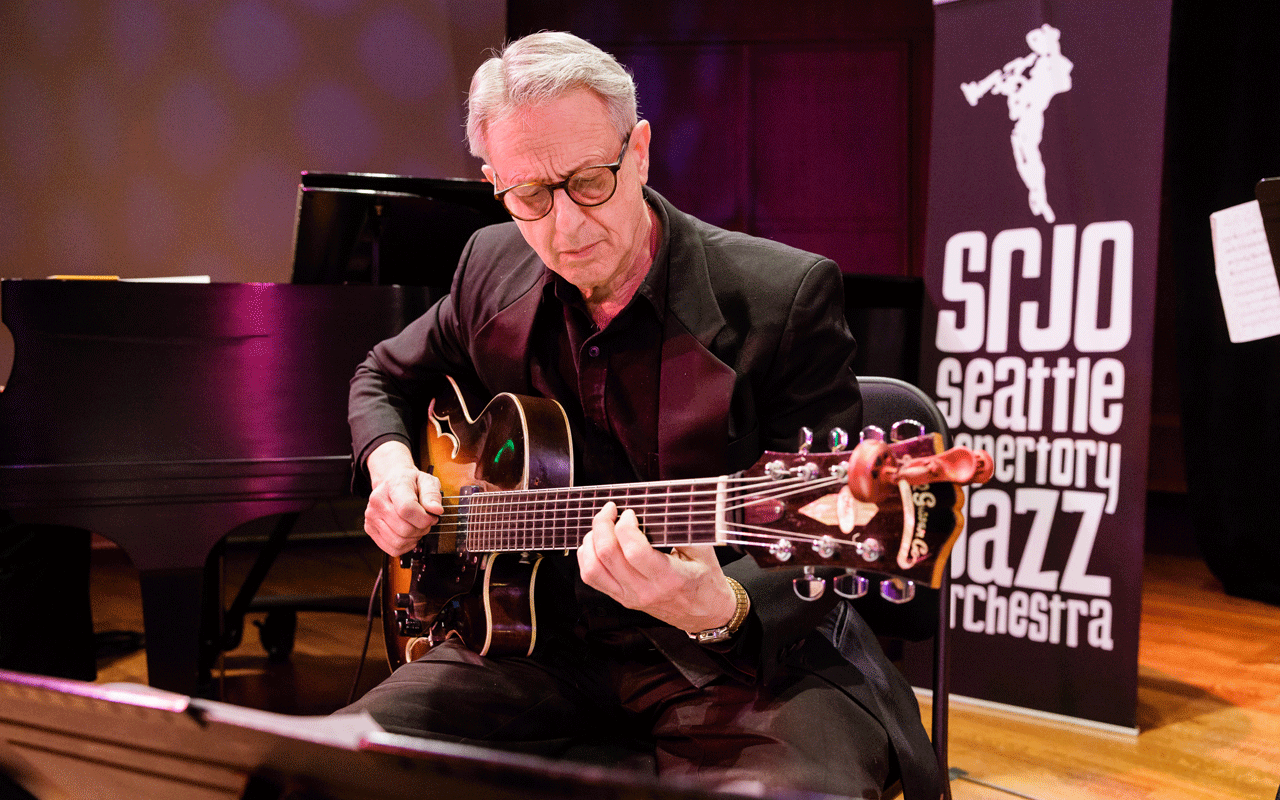
Trumpeter Nathan Breedlove, Tacoma-born and Memphis-raised, boasts a varied career. A fifteen-year spell in New York led to European tours with avant-garde luminaries David Murray and Jemeel Moondoc, and a Grammy-nominated tenure with Jamaican legends the Skatalites. Since returning to the Seattle area, he has enjoyed a lengthy stint with the Seattle Repertory Jazz Orchestra and formed a partnership with bassist Phil Sparks and drummer Brian Kirk in the NU Trio. Asked about the source of his versatility, Breedlove reckoned “I’m a child of Charlie Parker. So everything I do has that bebop kind of thing underneath.” Informed by his immersion in bebop, Breedlove realized that music is a “universe of beautiful things…there are no bad notes or anything, it’s just the understanding of harmony to pull it all together.”
Comparing the local scene to New York, Breedlove considers Seattle “a loving community. It’s not the backbiting kind of East Coast thing that New York is known for, where you have piranhas and sharks…we’re all, like, just the same type of fish out here, you know.”
In his Golden Ear acceptance speech, Breedlove proclaimed his Hall of Fame induction “my seminal moment.” Elaborating on that sentiment after the ceremony he explained, “It just gives me encouragement, because it’s really hard when you’re at my status in the music business to procure work and recording deals and contracts, which are non-existent. You can’t get any managers or agents anymore. It’s just a struggle to keep your music out there. So, to get recognition like this just gives me, like, ten more years that I can pursue this thing.”
Guitarist and drummer Milo Petersen has been active since the 1970s; career highlights include guitar trio dates featuring his former drum teachers Billy Hart and Victor Lewis, and a pair of albums backing Steve Griggs in a quintet featuring legendary Coltrane drummer Elvin Jones. Drumming with his own Jazz Disciples quintet, Petersen recorded the acclaimed Visiting Dignitaries.
Petersen started out on guitar, but a revelatory visit to New York opened his ears to new musical possibilities. “I was inspired by seeing Victor Lewis, in 1978, perform at the Village Vanguard with the Woody Shaw Septet, playing his compositions,” he says. “I was so amazed at the writing of this drummer, and I became very inspired to play the drums, and to write music in which I played the drums.”
Though he didn’t begin until he was about 25, Petersen realizes in retrospect that taking up the drums was a natural progression: “I remember early on, when I was first starting, I had teachers commenting on my rhythmic strengths.” As he honed his drumming chops, he developed a holistic approach to his instruments. “If I’m playing drums, I’m still thinking of the harmony and the melody. If I’m playing guitar, I’m still trying to be acutely aware of the rhythmic nature of everything,” he says. In addition to the creative possibilities, doubling up has proved a practical advantage. “If I have two drum gigs a week and two guitar gigs a week, that’s two more gigs than I would have had if I didn’t play the drums.”
Since returning to Seattle in 1991 following four years in New York, he’s become a local fixture, backing countless artists alongside his own projects, and enjoying a lengthy run in the Seattle Repertory Jazz Orchestra. He has also become a successful educator, teaching at Bellevue College and Seattle Central Community College, among other institutions; as a guitar instructor, he has coached students Lance Taber, Tyler Feldman, Reed Ferris, and Adam Shimabukuro to victories in the Essentially Ellington competition.
As for his Hall of fame induction, Petersen remarks, “It feels good to be noticed, and for that, I’m grateful.” Looking back on his career, he shares the common idealistic conception of jazz. “If you try to make hit pop music, you’re doing it because you want to be famous and make money. If you make this music, you’re doing it because you love the art form and you love the values of democracy, equality, and inclusion.” Peterson emphasizes that a career in jazz requires stubborn dedication. “The awards are nice, but it doesn’t have a lot of bearing on what we do.”
COMMUNITY IN ACTION AWARDS: LISA HAGEN GLYNN & BRAD ROUDA
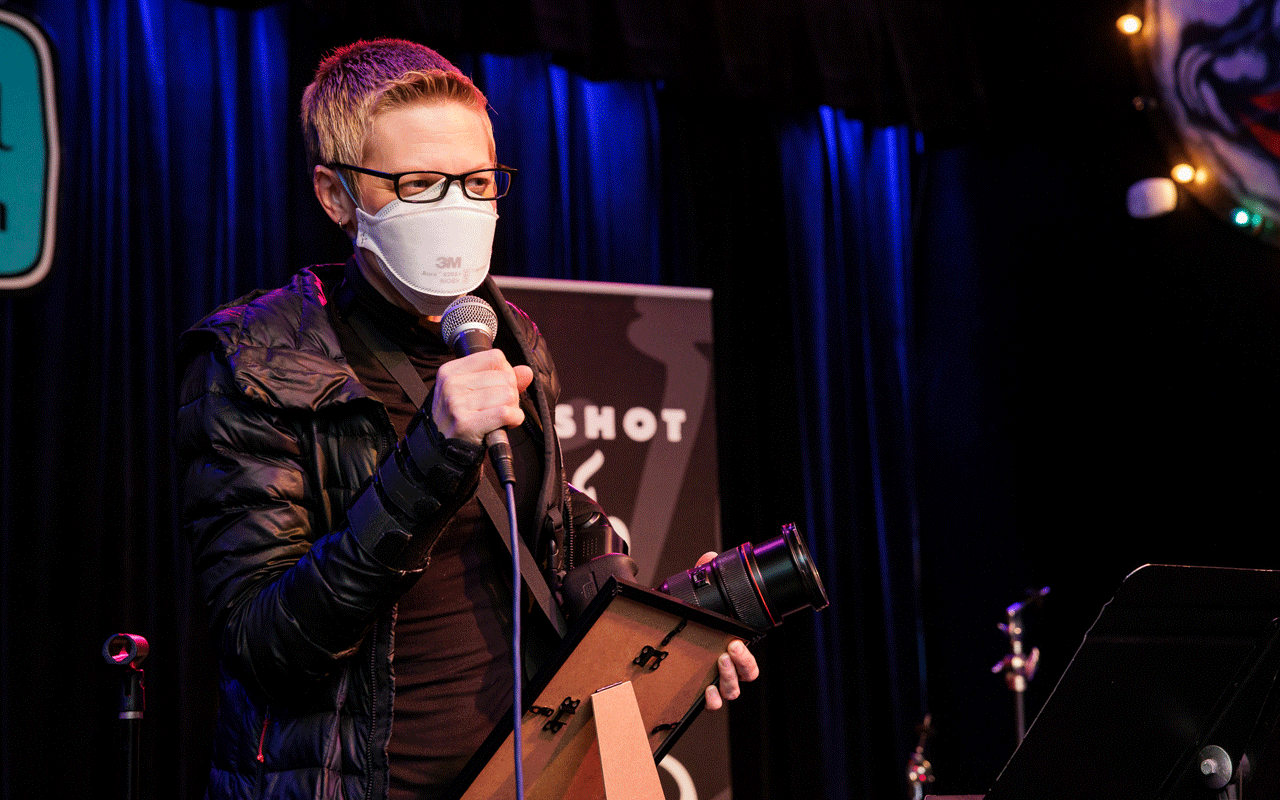
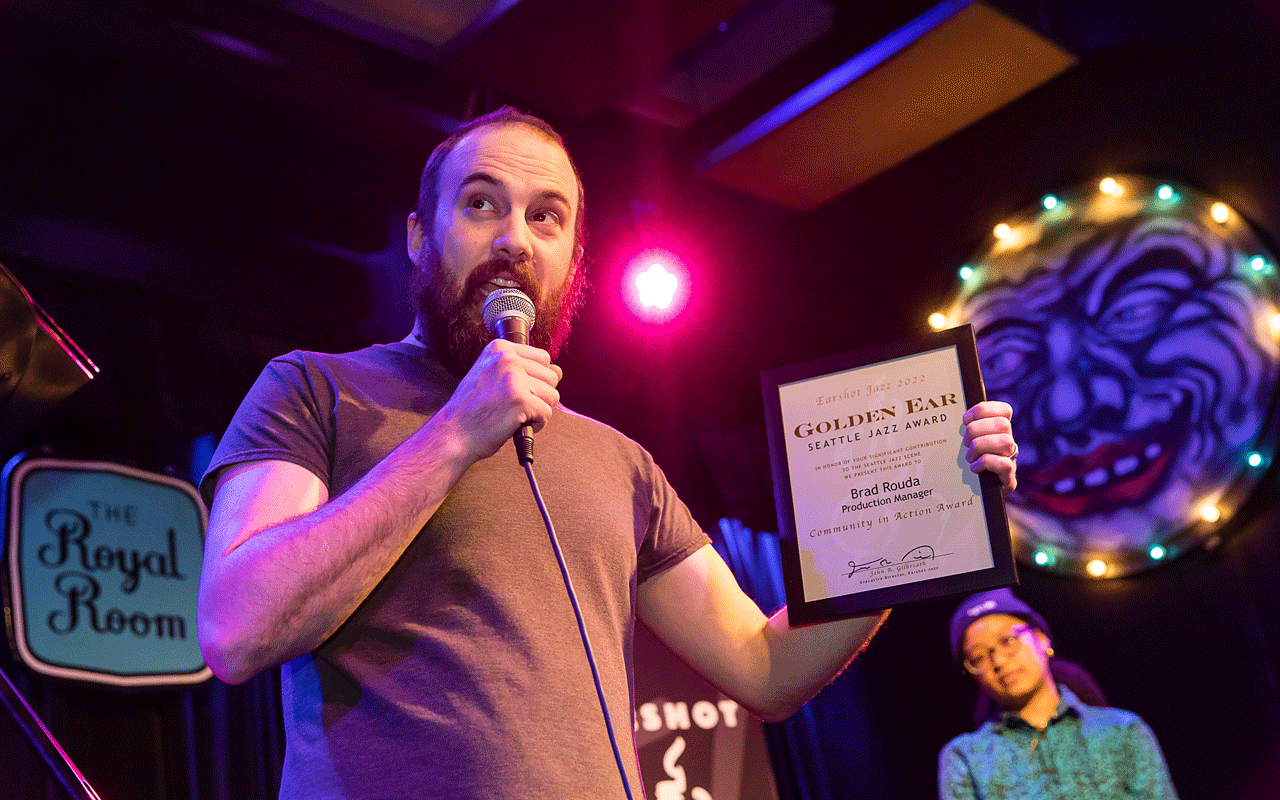
The players onstage may get the glory, but no music scene worth its salt lacks for dedicated people behind the scenes—a dedication exemplified by photographer Lisa Hagen Glynn, who has documented Earshot performances since 2018, and Royal Room production manager Brad Rouda, on staff since its December 2011 opening.
Attend a few Earshot concerts and you’ll start to recognize Hagen Glynn: lithely contorting herself at the lip of the stage to capture a close-up without blocking the front row’s view; roaming the aisles at Town Hall to find the perfect angle. In a conversation after the awards presentation, she explained the purpose behind it all: “I really want to capture the emotion of the moment—the thing that makes jazz special.” Hagen Glynn experienced her own emotional moment at the Golden Ears; hired to photograph the ceremony, she learned mid-shot that she was among the honorees. “It was a huge surprise to me. It was so unexpected,” she says. If she was overwhelmed, she hid it well. Moments after accepting her award, she got back to work. She even insisted on grabbing a few takes of the honoree group photo before posing in it herself.
Rouda was also working that night, setting up microphones for the awards presentation and serving as front-of-house engineer for the Marina Albero Trio and The Royal Room’s Monday night jam session. Rouda has dabbled in making music of their own over the years, as co-leader of Dangerknife and founder of the Not On Label recording imprint, but feels most at home creating a live sound mix. “Being behind the board allows me to interact with the band—with the music—in a way where it’s more than just listening to a CD, or a record or streaming, [whatever] the medium is out there,” they explain. They were equally surprised to be honored; “Usually there’s not much acknowledgment unless things go wrong. Yeah, like, that’s usually when people realize what my job is.” Thanks to their expertise, more often than not things go right. They strive to provide consistency in the notoriously turbulent touring business. The next time a musician plays The Royal Room, “they’re gonna find it [the musical equipment] how they left it last. Like, there will still be a piano here. As much as it pains me at times, there will still be a B-3 that we get on stage. It’s heavy, but it’s great.”
